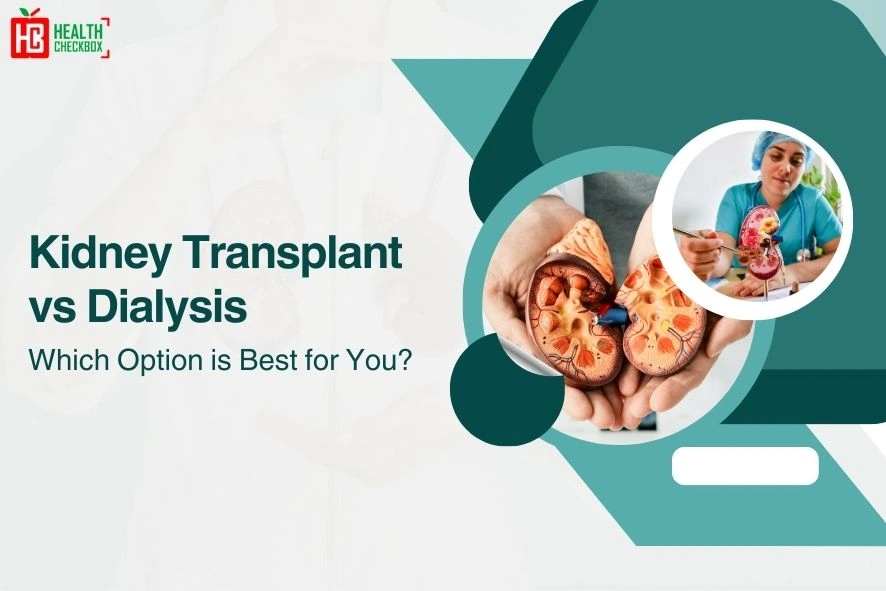Kidney disease is one of the fastest-growing health issues worldwide. According to a report, approximately 14% of people suffer from chronic kidney disease (CKD). Kidneys filter the blood and produce new, fresh blood cells; they remove all the waste products of our body. Kidneys help to balance water and make the urine that flows through these organs into the bladder. However, when the kidney disease occurs, it affects all the functions. So, to treat these chronic diseases, doctors recommend two treatment options: kidney transplant and dialysis. This blog will help you to decide on kidney transplant vs dialysis from their pros & cons, and risks.
What is a Kidney Transplant?
A kidney transplant is a major surgery for kidney disease. In this procedure, doctors transplant a failure of damaged kidney into a healthy kidney. The efficiency and survival of a transplant are much higher compared to other kidney treatments. The eligibility for this process, you might have some serious kidney disease, such as end-stage kidney disease and kidney failure, or damage. Nowadays, kidney transplant technologies are becoming increasingly advanced day by day. Two types of kidney transplant are categorized based on the donor: living donor and deceased donor.
- Living Donor: The donor is generally a member of the family, a relative, or a close friend. The living donor may be a stranger who wants to help someone who needs a kidney. The success rate of a living donor transplant is much higher compared to a deceased donor transplant.
- Deceased Donor: The donor who has recently died of causes not affecting the kidney. The deceased donor has signed an organ donor card before death, and before taking that organ, the family’s permission is required.
Pros and Cons of Kidney Transplant
There are “two sides of the same coin,” and every treatment has its own pros and cons. Here we discuss the pros & cons for a better knowledge of kidney transplantation.
Pros
- A successful kidney transplant surgery improves the life span or life expectancy of a patient.
- You can return to a normal life and may stop the dialysis procedure.
- It helps in removing waste products and fluid from the blood.
Cons
- In a kidney transplantation, there can be a risk of infection and bleeding. So, to avoid these types of problems, consult with an experienced doctor.
- The problem with this surgery is finding a donor; sometimes, the waiting period is long.
- In some rare cases, the body rejects the new kidney.
What is Kidney Dialysis?
To remove the excess water, waste, and salt from the blood, the doctor suggests the kidney dialysis treatment. This treatment is generally for those patients whose 80% to 90% of their kidneys do not function properly and their GFR (Glomerular Filtration Rate) is under 15. Life can be extended up to 10 years after kidney dialysis. But you have to know that the kidney failure is not completely cured with dialysis; you have to use dialysis alternatives for this. Kidney dialysis is also divided into two types:
- Hemodialysis (HD): In this medical procedure, the dialysis machine (dialyzer) filters the blood from the outside of the patient’s body. After filtering the blood (removing extra salt, water, and trash), the fresh blood returned to the body. This treatment is complete in 3 times in week, and the patient spends 3-5 hours in the hospital for performing this treatment.
- Peritoneal Dialysis (PD): In this medical procedure, with the use of a lining of the abdomen filter the microscopic blood vessels located inside the peritoneum. After the peritoneum absorbs extra water, waste, and salt from the blood, it drains them out of the body. Patients can perform peritoneal dialysis (PD) at home and can do several exchanges of the dialysate.
Pros and Cons of Kidney Dialysis
Here are some benefits and disadvantages of kidney dialysis:
Pros
- Hemodialysis is the best option if a transplant is not available.
- You can use peritoneal dialysis at home.
- It helps to extend the life of the kidneys.
- Does not require a major surgery.
Cons
- Visit the hospital regularly for treatment.
- Increase the risk of low blood pressure and cramping.
- Not a permanent treatment.
Kidney Transplant vs Dialysis: Which One is Better?
Here is a comprehensive comparison of kidney transplant vs dialysis:
- Treatment Duration: Kidney transplant is a one-time surgical procedure, but it requires regular visits to your healthcare hub for monitoring. While dialysis requires 3 sessions per week and each session will be 3-5 hours.
- Health Effects: Dialysis does not restore normal kidney function, while transplant treatment naturally restores more kidney function. Both have some health effects, but a kidney transplant has fewer risks compared to dialysis.
- Cost: The cost of dialysis per session is up to 5000 INR, and the annual cost is approximately 5,00,000 INR. Kidney transplant surgery costs range from 5,00,000 INR to 15,00,000 INR. Over time, a transplant is a more cost-effective option.
- Lifestyle Changes: Dialysis has some limitations, including diet restriction, regular hospital visits, etc. Transplant recipients experienced a better quality of life and less dietary restriction. The proper diet is one of the best ways to cleanse the kidneys, which helps in improving the kidney or patient’s health.
- Life Expectancy: Both have different life expectancies; the life span after dialysis is 5-10 years. Kidney transplant recipients live longer compared to dialysis recipients, their life expectancy is 15-20 years.
Conclusion
This blog has detailed information on kidney transplant vs dialysis, including donors, types, cost, and health effects. When the thing is about our life and health, don’t take it lightly. Kidney disease is one of the scariest health diseases, so choose a better treatment option by consulting with an experienced doctor.

